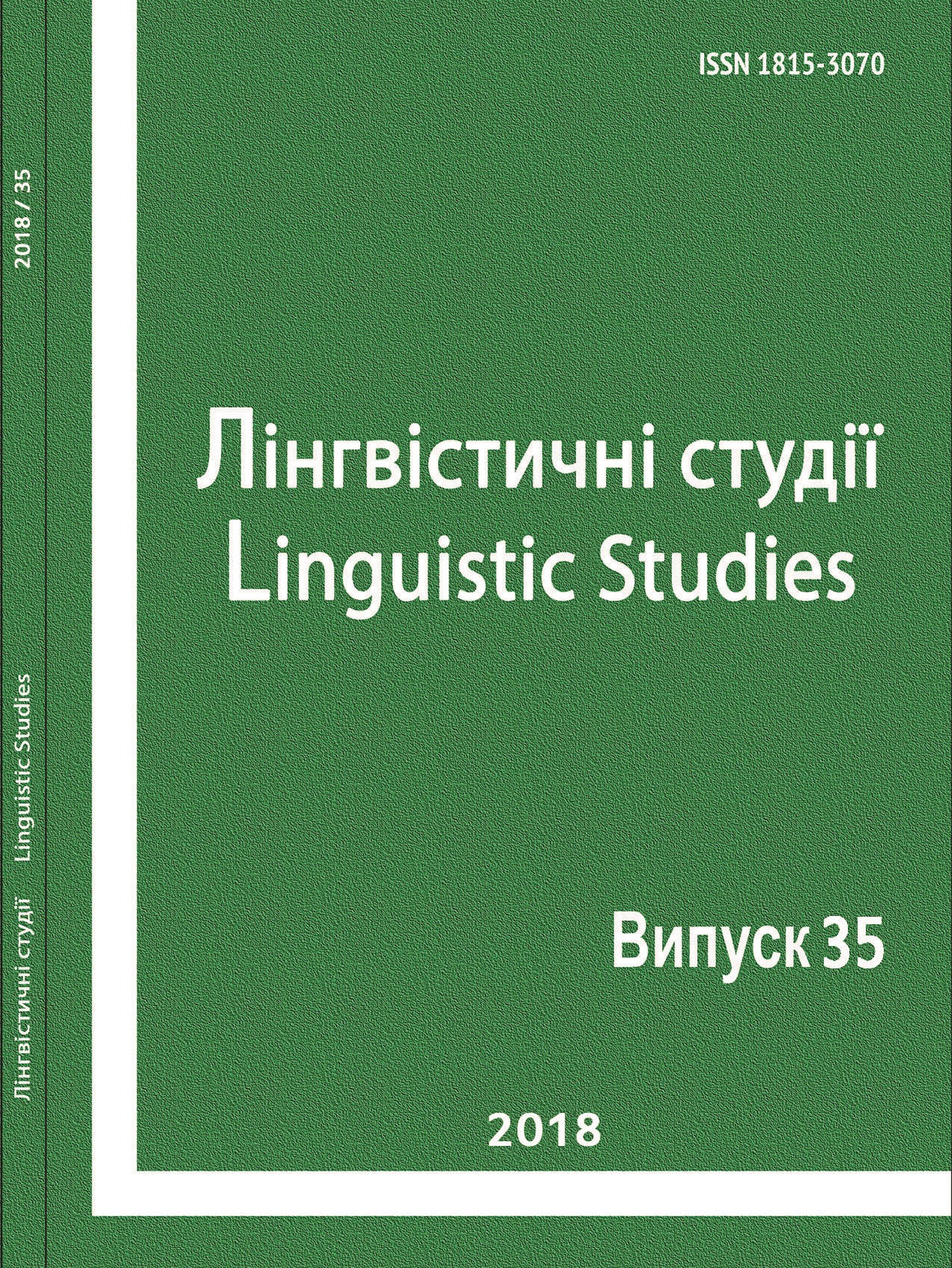Figurative Component as an Inherent Part of a Word Semantic Structure.
DOI:
https://doi.org/10.31558/1815-3070.2018.35.10Klíčová slova:
figurative component, semantic structure of a word, lexical meaning, lexico-semantic variant of a wordAbstrakt
The figurative component, as an inherent component in the structure of the connotative structure of a word, is based on the expression of one object or phenomenon by means of another. These two objects are not identical but real or imaginative associations are found between them. The figurative component is tightly intertwined with other connotative elements and characterized by five cognitive parameters. Figurative component is based on a potential, differential and nuclear semes of the denotative meaning. Figurative component of a word differs from other connotative elements in the ability to produce a new lexico-semantic variant of a word, which expresses speaker’s subjective opinion, his emotional state, and his attitude to another person. Figurative component is a transitional element between semantic structure of a word and a semantic paradigm of a word. The emergence of a figurative nomination, as one of the most important ways of semantic derivation and its passage into the active vocabulary, reflects the continuity of the process of cognitive activity of a man.Reference
Allwood, Jens. “Meaning potential and context. Some consequences for the analysis of variation in meaning.” Cognitive approaches to lexical semantics. Berlin: Mouton de Gruyter, 2003. pp. 29–65. Print.
Aristotle. “Ritorika. Poetika (Rhetoric and Poetics).” Moscow : Labirint, 2000. Print.
Arnold, Irina. “The English Word (Lexicology of English Language).” Moscow. Visshaya Shkola, 1986. Print.
Bebchuk, Elena. “Obraznyi komponent v leksicheskom znacheniyi russkogo sushchestvitel’nogo (Figurative component in the lexical meaning of a Russian noun).” Diss.Voronezh, 1991. Print.
Belekhova, Larisa. “Obrazniyi prostir amerikans’koiyi poeziyi : lingvokognitivniyi aspekt (Figurative field of American poetry : linguistic and cognitive aspects)”. Diss. Kyiv linguistic university. Kyiv, 2002. Web. 12.03.2010.
Blinova, Olga. “Obraznost’ kak kategoria leksikologiyi (Figurativeness as a lexicological category. Lexis and phraseology expressiveness”. Scientific digest (1983): 3–11. Print.
Buldakov, Vladimir. “Konnotatsia v znamenatel’noy leksike i frazeologiyi sovremennogo nemetskogo yazika (Connotation in categorimatic lexis and phraseological units of modern German language).” St. Petersburg, 2011. Diss. Web. 22.01.2018.
Coulson, Seana and Oakley, Todd. Blending and coded meaning: Literal and figurative meaning in cognitive semantics / Journal of Pragmatics 37. 2005. pp. 1510–1536. Web. 16.04.2018.
Ginzburg R. S., Khidekel S. S., Knyazeva G. Y., Sankin A. A. “A Course in Modern English Lexicology.” Visshaya shkola. Moscow, 1979. Print.
Giora, Rachel. Literal vs. figurative language : Different or equal? Journal of Pragmatics, 34/4. – 2002. – P. 487–506. Web 16.04.2018.
Goverdovsky, V. I. “Opit funktsional’nogo tipologicheskogo opisaniya konotatsiyi (Practice in Functional Typological Description of Connotation)”. Moscow, 1977. Abstract. Print.
Karasik V. I. Status of the person in the meaning of the word. – Volgograd: Izdv-VGPI, 1989. – 112 p. Print.
Kustova, Galina. “Tipy proizvodnikh znacheniyi i mekhanizmy yazikovogo rasshireniya (Types of derivative meanings and mechanisms of language extention)”. Moscow, Yaziki slavyanskoy kul’tury, 2004. Print.
Lebedeva, Maria. “Obraznye aspecty v semantike angliyskih sushchestvitel’nyh (Figurative aspects in semantics of English nouns)”. Moscow, 1981. Print.
Levyts’kyi, V. V. “Leksikologia nimets’koiyi movy (Lexicology of German language)”. Kyiv : Nova Kniga, 2014. Web. 23.01.2018.
Mel’nychuk, N. “Emotyvnist’ ta ekspresyvnist’ yak osnovni komponenty konotastiyi adjectyviv angliys’koyi movy (Emotiveness and expressiveness as main components of connotation in English adjectives).” Vinnitsa : Naukovi zapysky (2014) : 152–157. Web. 22.01.2018.
Norén, Kerstin and Linell, Per Meaning Potentials and the Interaction between Lexis and Contexts: An Empirical Substantiation Pragmatics. International Pragmatics Association. – 2007. – P. 387–416. Web. 16.04.2018
Peftieva, Olena. “Figurativeness as a semantic component of lexical meaning in designations of person in English and Ukrainian languages.” Nestroyevoy. Kyiv, 2015. Print.
Peftieva, Olena. “Genesis of figurative lexico-semantic variant of a word.” DonNU (Vinnitsa). Linguistic studies (2016) : 45–50 Print.
Sternin, I. A. Problemy analiza struktury slova (Problems of Analysis of Word Structure). Moscow-Berlin : DirectMEDIA, 2015. Web. 32.01.2018.
Yurina, Elena “Kompleksnoey issledovanie obraznoy leksiki Russkogo yazika (Complex study of Russian figurative lexis).” Diss. Tomsk, 2005. Abstract. Web. 20 Jan. 2018.


